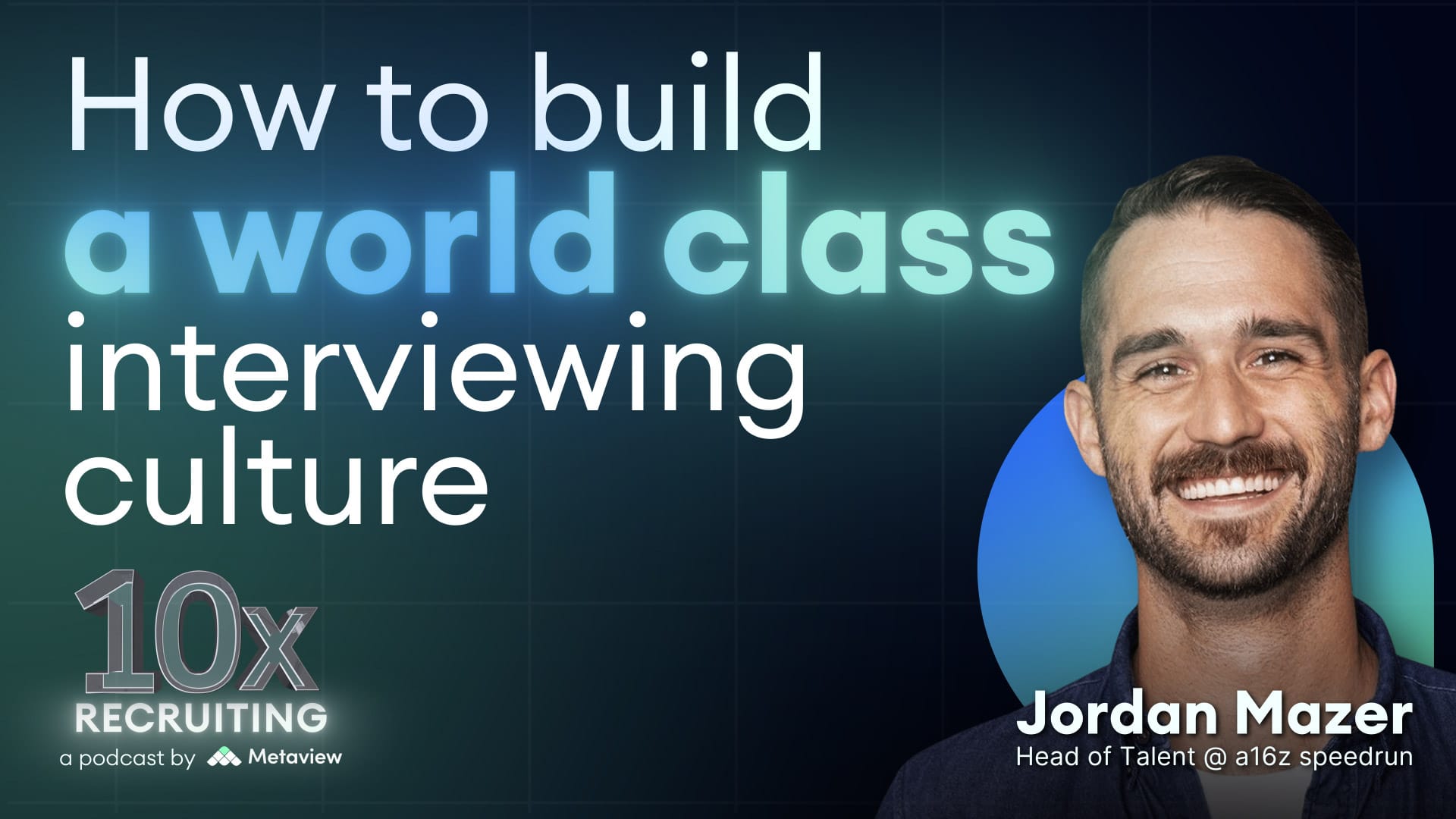In the first episode of 10x Recruiting, Nolan Church gets into it with Jordan Mazer, Head of Talent at speedrun, Andreessen Horowitz's early-stage gaming accelerator. Jordan, who also previously worked at industry giants like Amazon and Riot Games, shares his insights on what it takes to build a world-class interviewing culture and why achieving hiring excellence requires a cultural shift in how we think about interviewing. He also shares his lessons on the importance of building trust with hiring managers by delivering value, and so much more!
Listen, like, and subscribe on:
Or wherever you get your podcasts
❇️ Key Topics (video episode timestamps)
00:00 Key takeaways from Nolan and Siadhal (Metaview co-founder)
05:05 Why most companies don't include interviewing as part of performance reviews
10:00 Focus on quality interviewing comes from the top
14:15 The cost vs. investment approach to hiring
17:00 Founders and hiring managers need to intrinsically understand the pain of making a bad hire
18:30 Interviewers are not assessors of candidate fitness for the role
22:20 Thoughts on hiring committees
27:30 The pros and cons of work trials
32:50 Building trust with hiring managers by delivering value
Key Takeaways
- Great interviewing isn’t instinctual; it’s trained. Most people aren’t naturally great interviewers. Structure, repetition, and role clarity are essential.
- Make interviewing matter. Companies like Amazon don’t just encourage good interviewing — they tie it to promotions, performance reviews, and real consequences.
- TA influence comes from value, not volume. Recruiters build credibility by delivering results — especially in an industry where expectations are low and impact stands out.
"Interviewing is not a naturally occurring capability. Most people want to believe their ability to assess others is high quality because it's relevant in every part of their life. They want to believe they have a good read on people. But when they get into an interview context, it’s not natural to do a good job without training, thought, and practice.” — Jordan Mazer
In the first episode of the 10x Recruiting podcast, our host Nolan Church sits down with Jordan Mazer, head of talent at Andreessen Horowitz’s speedrun. Jordan has helped hundreds of startups hire effectively, and his experience at Amazon, Riot Games, and a16z gives him a front-row view into what separates world-class interviewing cultures from the rest. In this recap, he helps us break down what it takes to build a winning interview culture.
Why great interviewing is overlooked
According to Jordan, most companies don’t prioritize interview quality because they operate from false assumptions. They believe that good judgment comes naturally — after all, people assess others in everyday life all the time. But interviewing well isn’t instinctual. It’s a skill that takes structure, training, and iteration.
The second issue: Building a rigorous interviewing culture is hard. It means vetting interviewers, reviewing scorecards, aligning on standards, and holding people accountable when the bar isn’t met. Few companies are willing to do the work.
Until they make a bad hire.
Jordan points out that most people have to “touch the stove” themselves to really understand the consequences. For newer managers or founders especially, the pressure to move fast often outweighs the desire to get the hire right. But once you’ve dealt with the pain of a low performer — missed deadlines, cultural drag, team churn — it changes your perspective.
Why world-class interviewing needs to come from the top
Jordan shares that st Amazon, hiring wasn’t just important; it was institutional. Interviewing participation and quality was a performance metric, factored into promotions and job security. Here’s how they did it:
- Interview feedback was reviewed by external "bar raisers"
- Employees were expected to participate in hiring and do it well
- Poor interviewing could stall your career (or end it)
This approach worked because Amazon’s leadership reinforced the message top-down. Hiring was part of company values — and not just in theory. People were measured on how well they helped hire.
Jordan contrasts this with other companies where interviewing is technically encouraged but, in reality, is subtly discouraged. At one of Jordan’s previous organizations, for instance, employees who cared about improving the hiring process often found themselves penalized for prioritizing it over immediate deliverables.
The takeaway: If you want a strong interviewing culture, leadership has to make it matter. Make it a performance lever. Measure it. Reinforce it.
You can’t shortcut great hiring
Hiring well takes time. But too many companies treat it like a box to check — or worse, a burden to minimize.
"This is just investment versus cost mentality," Jordan says. Companies that treat hiring as a cost try to minimize the time it takes. Companies that treat it as an investment build systems and expectations around doing it well.
This includes giving interviewers enough time to prepare, run thoughtful conversations, and write useful feedback. It also includes top-down clarity that interview quality impacts business performance.
Because it does.
Nolan shares an example from his time at DoorDash when engineering managers resisted spending more time interviewing. Instead of forcing it, he asked them to help source candidates themselves. Experiencing the lack of response firsthand built empathy — and ultimately led them to commit more time to the process. This involvement drove better results, and, eventually, a hiring flywheel.
As Jordan puts it: "Once you’ve managed any number of low performers, you come to realize the challenges presented by having the wrong person are far worse than having no person at all."
Interviewers aren't assessing the candidate’s fit for the role
One of Jordan’s most counterintuitive takes is also one of his most important: Interviewers aren’t there to assess overall candidate fit. They’re there to evaluate specific competencies.
When interviewers go off-script — chasing red flags outside their assigned area or trying to assess the candidate holistically — they introduce noise into the process. Worse, they often neglect the signal they were supposed to gather in the first place.
This causes blind spots, confusion, and misalignment. It also creates a culture where interviewers implicitly say, "I don’t trust my colleagues to do their job, so I’ll do it for them."
The hiring manager, Jordan emphasizes, is the only person with enough context to make the final call. Interviewers should stick to their module, deliver crisp signal, and trust the process.
Hiring committees can work as long as they’re focused on synthesizing signal, not redoing each interview. As Jordan explains, “This is mostly about stopping interviewers from doing a thing that constantly ruins interviewing processes.”
What great interview cultures do differently
So, how do the best companies build a high-performing interview process? Jordan highlights a few key components:
1. Leadership buy-in
Recruiters can’t do this alone. High-quality interviewing requires executive support and clear prioritization. Without it, process improvements rarely stick.
2. Performance accountability
At companies like Amazon, interview quality was tied to key performance outcomes like promotions. At most companies, it’s an afterthought. If you want people to take it seriously, tie it to outcomes.
3. Clear role definition
Each interviewer should know exactly what they’re evaluating — and what they’re not. This is how you get reliable, non-overlapping signal.
4. Real consequences
If someone consistently underperforms as an interviewer, they shouldn’t be on panels. And if interviewing is truly valued, this decision should carry career implications.
5. Enough time
You can’t rush quality. If your interviewers are under-resourced, the entire process suffers. Budget time for prep, feedback, and talent calibration.
6. Smart structure
Jordan supports work trials and project-based assessments, especially at early-stage companies where every hire carries risk. Just be mindful of scale, speed, and legal exposure as you grow.
He also notes that companies need to weigh competitiveness. While work trials can yield stronger signals, they’re not always realistic at scale — especially if your competitors offer faster, easier processes.
What TA leaders can take away
Great interviewing cultures aren’t built overnight. But they are built deliberately with systems, support, and shared standards.
In this podcast episode with Jordan Mazer, talent leaders will find a practical blueprint for doing just that:
- Clarify roles: Each interviewer should know their exact responsibility and avoid assessing anything else.
- Train deliberately: Most people aren’t naturally great at interviewing. Structure and repetition matter.
- Prioritize it from the top: Without executive support, even the best-intentioned efforts fall flat.
- Treat time as a signal: Great hiring takes time. Budget accordingly.
- Hold people accountable: If interviewing is truly important, poor performance should have consequences.
Deliver value early: Recruiters earn influence by showing results, not by asking for respect.


